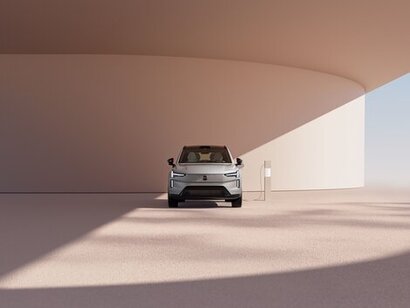
Bi-directional charging is a technology that allows an electric car to give back extra battery power to a compatible grid, helping to balance the grid during peak hours and reduce the need for fossil-generated electricity. Volvo Cars new flagship model, the EX90 SUV, will be the first Volvo car equipped with all the necessary hardware and software to enable bi-directional charging and direct energy storage from solar.
With Göteborg Energi Nät AB, the local grid company in Gothenburg, Volvo Cars is launching one of the first vehicle-to-grid (V2G) pilot programmes that aims to test such V2G technologies on the local energy grid and in a home environment with real customers. The pilot deliberately uses a low-cost AC wallbox because it will help to accelerate widespread adoption of the technology.
The pilot project not only aims to gain acceptance from a grid company and to demonstrate to other grid companies that V2G programmes can provide tangible benefits, but to create a testing arena for new technologies that are central to the future of Volvo Cars outside our labs.
“With bi-directional charging, you can use your car battery as an extra energy supply, for example to provide power to your home, other electric devices or another electric Volvo car” said Alexander Petrofski, the new Head of Volvo Cars Energy Solutions. “The next step would be to enable this feature all around Sweden, and hopefully that will pave the way for even broader acceptance of similar charging and energy storage services around Europe.”
Volvo Cars aims to be a fully electric car company by 2030 and will be bringing millions of electric Volvo cars to the roads in the coming years. The company’s engineers have calculated that the total battery capacity of that fleet will reach around 50 GWh by the mid-decade. While these cars will use several TWh in electricity each year, this energy consumption is flexible and can be moved in time via smart charging.
At the same time, data from the Volvo fleet shows that the average daily drive in Europe uses less than 10 kWh, while 90 per cent of all daily drives use less than 20 kWh. This means there is ample spare battery capacity left that can be used for other purposes, with the possibility of both financial benefits for customers and significant climate benefits.
Bi-directional charging allows customers to repurpose energy stored in the battery of their electric Volvo at a later stage. V2G is one of those scenarios because it allows for energy to be delivered back to the power grid from the battery of an electric car when the demand for electricity is higher – against compensation.
“With the help of smart charging, you can charge your electric Volvo at the best available time from a sustainability and economy perspective” added Mr Petrofski. “Now imagine you could use that energy later, perhaps during peak times when prices are higher and the energy mix less sustainable. The idea with building an energy ecosystem around your car and the batteries is that it allows you to save money and reduce your CO2 emissions, while energy firms benefit from reduced grid investments and a lower overall impact on the environment.”
V2G is just one of the technologies that we envision as part of that ecosystem offer under the Volvo Cars Energy Solutions banner. We’re also looking at vehicle-to-home (V2H) products that allow you to send back energy to your house and lower your energy bill, as well as vehicle-to-load (V2L) services whereby your electric car battery powers your camping gear or charges your electric bicycle.
Volvo Cars Energy Solutions is expected to generate significant new revenues from energy-related products and services every year, as well as new products not previously offered by Volvo Cars. In doing so, Energy Solutions is set to add value to the company’s core business, its customers’ daily lives and the environment.
For additional information:

